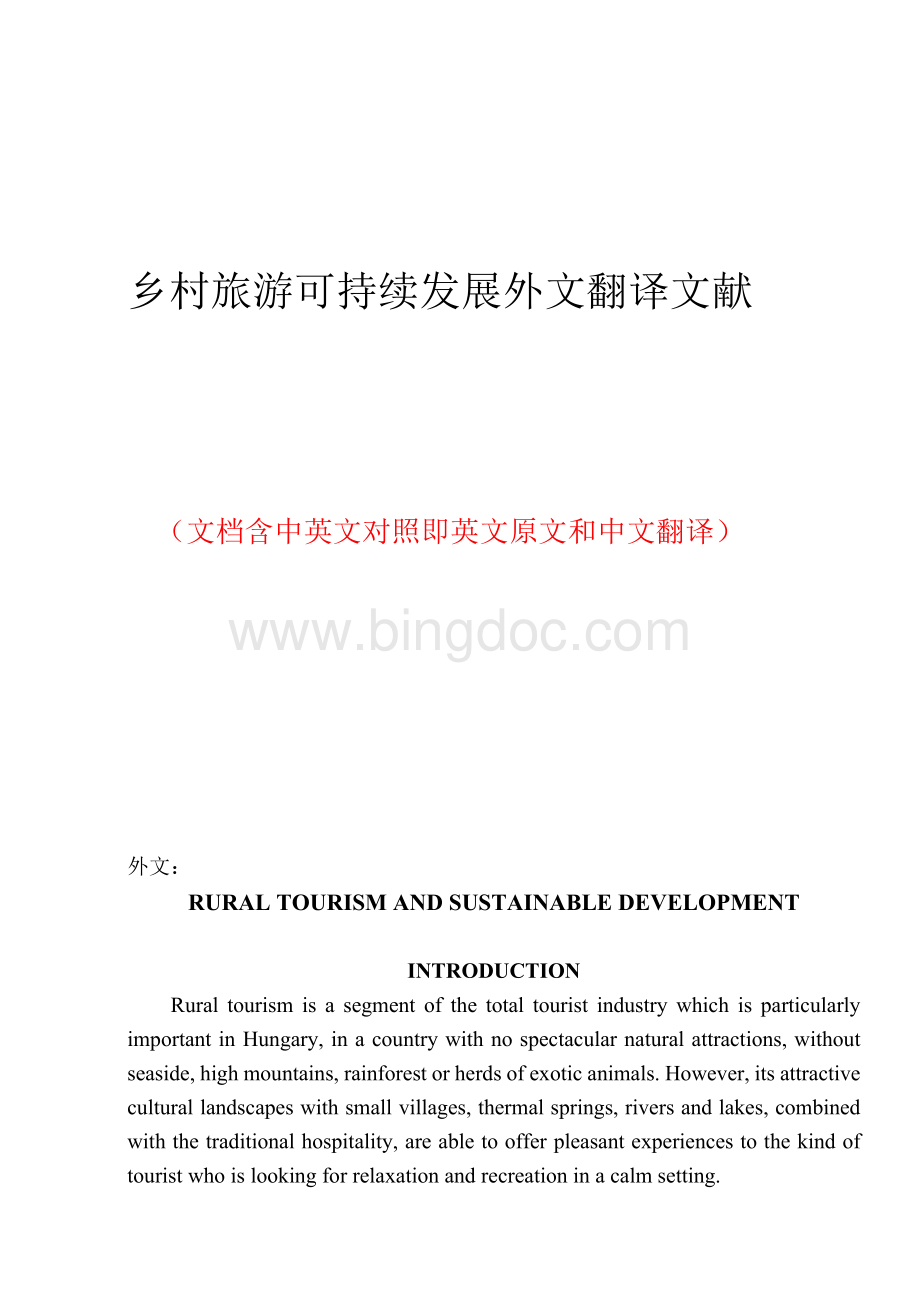乡村旅游可持续发展外文翻译文献Word格式文档下载.docx
《乡村旅游可持续发展外文翻译文献Word格式文档下载.docx》由会员分享,可在线阅读,更多相关《乡村旅游可持续发展外文翻译文献Word格式文档下载.docx(14页珍藏版)》请在冰点文库上搜索。

SUSTAINABLETOURISMDEVELOPMENT
TheconceptofsustainabledevelopmentwasintroducedbytheWorldCommissiononEnvironmentandDevelopmentintheBrundtlandReportin1987,definingsustainabledevelopmentas"
developmentthatmeetstheneedsofthepresentwithoutcompromisingtheabilityoffuturegenerationstomeettheirownneeds"
.
Tourismisoneoftheforemosteconomicactivitiesaroundtheworld,havingtransportedmorethan617millionpeopleinternationallyandgenerated448billionUSDinreceiptsin1997(WTO,1998).Itisamajoreconomicforce,havinggeneratedin1996anestimated3,153.3billionUSDingrossoutput,creatingemploymentforapp.255millionpeople,producingapp.10.7percentofworldgrossdomesticproduct,investingapp.766billionUSDinnewfacilitiesandequipmentannually,andcontributingmorethanapp.653.3billionUSDtoglobaltaxrevenue(WTTC,1996).
Thevolumeandsignificanceoftourismclearlyshowsthatitisnotenoughtodevelopnewformsof"
alternative"
tourisminordertominimisethenegativeandmaximisethepositiveimpactsoftourismdevelopment.Thewholesectormustbedevelopedandmanagedinawaythatitdoesnotdamagethenaturalandsocio-culturalenvironmentandthisistheresponsibilityoftheworld-widetourismindustry.
ThoughtheBrundtlandreportmadenospecialreferencetotourism,sinceitspublication,theroleoftourismintheprocessofcontinuouslymisusingtheEarth'
sresourceshasbeenanalysedandtheconceptofsustainabletourismappeared.
Sustainabletourismhasseveral-oftenseriouslydebated-definitions.AccordingtothedefinitionoftheFederationofNatureandNationalParks,sustainabletourismis"
allformsoftourismdevelopment,managementandactivitythatmaintaintheenvironmental,socialandeconomicintegrityandwell-beingofnatural,builtandculturalresourcesinperpetuity"
(FNNP,1993).ApublicationbytheTourismConcernandtheWorldWideFundforNaturedefinessustainabletourismastourismwhich"
operateswithinnaturalcapacitiesfortheregenerationandfutureproductivityofnaturalresources;
recognisesthecontributionthatpeopleandcommunities,customsandlifestyles,maketothetourismexperience;
acceptsthatthesepeoplemusthaveanequitableshareintheeconomicbenefitsoftourism;
andisguidedbythewishesoflocalpeopleandcommunitiesinthehostareas"
(TourismConcern&
WWF,1992).
Thoughtheexistingdefinitionsusuallydifferintheirfocusorlevelofelaborateness,themainmessageoftheBrundtlandReportseemstobemoreandmoreacceptedbythetourismindustryallovertheworld.However,thenotionofsustainabilityisaverycomplexoneandithasmanyramifications(Mowforth&
Munt,1998).
Ecologicalsustainability,whichmeansthattourismdevelopmentdoesnotcauseirreversiblechangesinagivendestination'
secosystem,isthemostcommonlyaccepteddimension,sincethereisanobviousneedallovertheworldtoprotectnaturalresourcesfromthenegativeimpactsoftourismactivities.Thegeneralgrowthofenvironment-awarenesshassignificantlycontributedtothistrend.Socialsustainabilityreferstotheabilityofacommunitytoabsorbtourism(boththeindustryandthetouriststhemselves)withoutthecreationofsocialdisharmony.Culturalsustainabilityinthecontextoftourismassumesthatagivencommunityisabletoretainoradapttheirowndistinctiveculturaltraitsagainstthepressureofboththeso-called"
touristculture"
andthe"
residualculture"
ofthevisitors(Jafari,1987).Economicsustainabilityreferstoalevelofeconomicgainfromtourismthatissufficienttoprovideanappropriateincomeforthelocalcommunity(comparedtotheinconveniencecausedbytheactivitiesofthetourismsector)andtocoverallthecostsofanyspecialmeasuretakentosatisfythetourists(thusapreconditionofeconomicsustainabilityistheattractivenessofanareaandtheperceivedhighqualityofitstouristsupply:
withoutbeinginacompetitivepositionintheworldmarket,nodestinationcanbeeconomicallysustainable).
Thedifferentaspectsofsustainabilitydonotcompete,butmustbeseenasequallyimportant.Highlevelofeconomicprofitabilitymustnotbeconsideredasatooltocoveroverthedamagedonetosocialornaturalresources,buttherelativefragilenatureoftheselattermustnotcreateaplanningenvironmentwhereeconomicconsiderationsarenotbeingtaken(properly).Sustainabletourismdevelopmenthastobeeconomicallyviableandnaturallyandculturallysensitiveatthesametime.
Aswecouldsee,inappropriatetourismdevelopmentresultsinincreasingstressondestinationsandconsequentlyinnegativechangesinthedestinations'
physical,economicandsocial-culturalcharacteristics.Inordertoavoidorminimiseunfavourableimpacts,decision-makersmustbeawareofallthefactorsthatplayaroleinthedevelopmentprocess.Inthemeasurementoftheprogressthatanindividualdestinationismakingtowardssustainabletourismdevelopment,sustainabilityindicatorsarecommonlyacceptedasonesetofusefultools.
INDICATORSOFSUSTAINABILITY
"
Indicatorsmeasureinformationwithwhichdecision-makersmayreducethechancesofunknowinglytakingpoordecisions"
(WTO,1996).Inotherwords,indicatorsareasetofusefulmeasuresofthosefactorsthatareimportanttothedecision-makers(therelativesignificanceofthesefactorsdependontheirrelevancetothedevelopmentobjectivesofagivendestination,andontheirimportancetotourists)."
Indicatorsarebothatoolformanagementtodayandaninvestmentinthefuture,sincetheyreducetheriskofinadvertentdamagetotheresourcebaseonwhichthe[tourist]industrydepends"
(WTO,1996).
Basedondifferentguidelinesandrecommendations(TourismConcern&
WWF,1992;
McCool&
Watson,1994;
Murphy,1994;
Howie,1996;
Swarbrooke,1996;
WTO,1996;
Mowforth&
Munt,1998),theindicatorssuggestedforthepurposeofthisstudyarethefollowing(Table1):
Table1-IndicatorsofSustainabilityinRuralTourism
Indicator
Measure
1.Stress
-Numberofvisitors/tourists(perannum/season)
2.Socialstress
-Ratioofvisitor/touristnumberstolocalpopulation(perannum/season)
3.Attractiveness
-Listofnaturalandculturalresources
-Rateofattractivenessofnaturalandculturalresources
4.Planningprocess
-Existenceoflocal/regionalplanfordevelopment
5.Tourismplanningprocess
-Existenceoflocal/regionalplanfortourismdevelopment
6.Areaprotection
-Categoryofprotection
-Percentageofprotectedareacomparedtothewholeterritoryofthedestination
7.Localinvolvement
-Ratioofthenumberoflocallyownedtouristbusinessestothetotalnumberoftouristbusinesses
8.Localcontrol
-Existenceofformalmeasures(publichearing,communitymeeting,localreferendum)toensurelocalcontroloverevelopmentplanningandimplementation
9.Employment
-Numberofjobscreatedintourism(full-timeequivalent)
-Ratiooflocalemployeenumbertothenumberofguestworkers
lO.Tourismcontributiontothelocaleconomy
-Proportionoftotaltaxincomegeneratedbytourismonly
11.Economicdiversity
-Shareofdifferenteconomicactivitiesinthetotaltaxincome
12.Energyconsumption
-Ratioofrenewableenergysourcestonon-renewableenergysources(consumption)
13.Wastemanagement
-Percentageofhouseholdswithpropersewagesystem
-Percentageofwastereceivingtreatment
14.Educationandtraining
-Percentageoflocalpeopleinvolvedintourismwithprofessionaltrainingandeducation
-Distributionoftourismemployeesbyeducation
-Percentageoftourismemployees(andlocalpeople)participatinginon-the-jobtraininginagiventimeperiod
15.Localsatisfaction
-Overallperceptionoftourism'
simpactsinlocalcommunity
16.Touristsatisfaction
-Overallsatisfactionoftouristsconcerningthequalityandthevalue/priceratioofthecomplextouristproduct
-Percentage/changeofrepeatvisitscomparedtofirst-timevisits
THECONCEPTOFRURALTOURISM
Ruraltourismisanoldandanewphenomenonatthesametime.Interestincountrysiderecreationstartedtogrewalreadyinthe19.centuryasareactiontothestressoftheincreasingurbanizationandindustrialisation.Theruralscenewasadmiredbypoetsandartists.